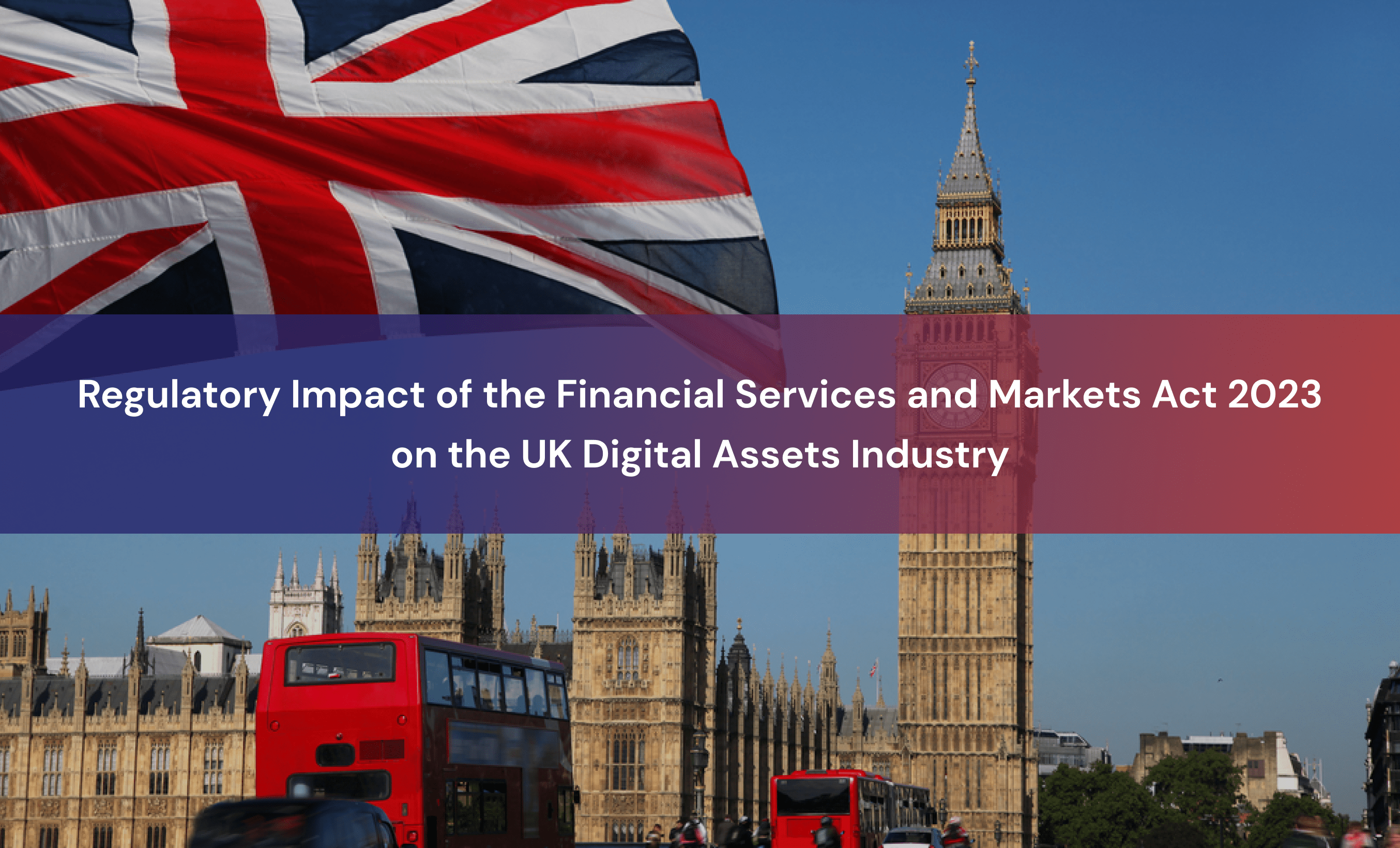This is a running article covering all regulatory developments and laws impacting digital assets and the crypto industry in the UK. As new developments occur, we will continue to add to the article. The latest development is regarding the Financial Services and Markets Act 2023 (FSMA 2023).
UK Regulatory Development: Financial Services and Markets Act 2023
The Financial Services and Markets Act 2023 (FSM 2023), aims to implement the outcomes of the UK Government’s Future Regulatory Framework (FRF) review. It seeks to seize the opportunities presented by Brexit and tailor financial services regulation to fit UK markets. The Bill originated in the House of Commons and completed its passage through Parliament on 27 June 2023. It received Royal Assent on 29 June 2023.
The U.K. is trying to catch up with the European Union, which recently finalized its Markets in Crypto Assets (MiCA) regulation. Mica has a predominant focus on stablecoins.
Importance for the digital assets industry
Basically, the Bill has three major implications:
- It recognizes all crypto as a regulated activity
- It allows the use of stablecoins, as a means of payment
- The bill aims to supervise crypto promotions as well
FSMA accomplishes its goals primarily by amending the existing e-money and payment regulatory frameworks.
U.K. wants the FSMA to give regulators the powers that they need to be able to set crypto rules, which the High Majesty’s Treasury, has been consulting on. New specific rules for the crypto sector could emerge within 12 months.
More specifically, the FSMA provides for the following:
- give HM Treasury powers to establish an FCA supervision regime for ‘digital settlement assets’ (aka stablecoins used for settling payment obligations),
- enable HM Treasury to recognize operators of systemic payment systems and systemic service providers using digital settlement assets for regulation and supervision by the BoE;
- enable the Payment Systems Regulator (PSR) to regulate payment systems using digital settlement assets;
New specific rules for the crypto sector could emerge within 12 months.
Summary of relevant proposals
Here are the most important proposals to be noted:
- New rules will place more responsibility on trading venues, such as crypto exchanges, to define detailed requirements for admission of crypto assets on the exchanges. They also must provide detailed disclosure documents.
- The proposed rules also target financial intermediaries like custodians and seek to set up a regime around the lending of crypto assets.
- There is a planned market abuse regime aimed at improving the market integrity, consumer protection, and operational resilience of firms.
- The consultation also proposes prudential and data reporting requirements for crypto companies.
- Proposals seek to regulate crypto ads and promotions. The Treasury wants this measure in place to stop dangerous and fraudulent entities from reaching out to local customers. These rules would require any type of advertisement to the public for engaging in investment activity, to be approved by an authorized entity.
Supplementary Legal Developments
Other important legal developments in the UK include:
- Economic Crime and Corporate Transparency Bill (ECCT Bill) and
- Law Commission’s report on digital assets (LCDA report)
The ECCT Bill seeks to add references to crypto assets in criminal and civil asset recovery powers. The Bill reached the Report Stage in January 2023 and is expected to be passed later this year.
LCDA Report
In July 2022, the LCDA Report was published, setting out key points that need addressing when considering digital asset legislation. One of the key points contained in the LCDA Report was that crypto-tokens do not really fall under either of the traditional definitions of kinds of property:
- For one, they are not properly “things” in possession (i.e. tangible, physical things)
- Nor are they things in action (i.e., rights enforceable by legal action like rights to sue for breach of contract, debts, or company shares).
So, the report puts forward a third type of personal property: the data object.
The data object is:
- composed of data in an electronic medium,
- exists independently of both people and the legal system and
- rivalrous (i.e., if I have it, you cannot).
The LCDA Report also analyses whether:
- “Control” (as opposed to “possession”) best describes the relationship between data objects and persons.
- A new set of rules to govern the transfer of title in relation to digital assets would be beneficial;
- the special defense of being a good faith purchaser for value without notice should apply to crypto-token transactions, and
- courts should have the discretion to award a remedy denominated in certain crypto-tokens in appropriate cases (as opposed to fiat currency).
The Law Commission’s final report on digital assets is due at some stage during 2023 and will be a hugely significant publication. It will set the tone for the legislative reform which, in turn, will impact those common law jurisdictions which are informed by English jurisprudence.
Civil Procedure Rules
Finally, 2022 saw an amendment to the Civil Procedure Rules. The amendment assists victims of crypto fraud in investigating what has happened to their misappropriated digital assets. A new gateway has been established where a claim or application can be made, for disclosures. A victim can obtain information regarding the true identity of the wrongdoer and/or what has become of the victim’s property. It has already been utilized by a victim of crypto fraud in the recent case of LMN v Bitflyer Holdings Inc and others. Disclosure orders were granted against six overseas cryptocurrency exchanges, highlighting the effectiveness of new rules.
Common Law Developments
We want to mention two important cases that came before the English courts in 2022.
The first is the decision of HHJ Pelling QC in Lavinia Deborah Osbourne v Persons Unknown. The Judge concluded there was an arguable case that NFTs are to be treated as property for the purposes of English law. In a subsequent judgment of 13 January 2023 in the same matter, Mr. Justice Lavender essentially agreed with the previous ruling. These rulings help build on previous decisions, in which it was found that cryptocurrencies are indeed property. Therefore the law applicable to real and other forms of property applies equally to digital assets. This has implications for cryptocurrency exchanges which may find themselves held to be constructive trustees when used for crypto fraud.
The second case is Tulip Trading Limited v Bitcoin Associated for BSV and Ors.
Tulip Trading covers a number of interesting questions concerning crypto assets. One such question asks whether blockchain developers owe fiduciary duties and a duty of care to their ultimate users. The case will now proceed to a full trial and all eyes will be on the progress of this important case.
#FSMA2023 #UKregulation #DigitalAssetsIndustry #CryptoRegulation #Stablecoins #FinancialServices #BrexitOpportunities #LegalDevelopments #ECCTBill #CaseLawDevelopments #NFTs #Future RegulatoryFramework





